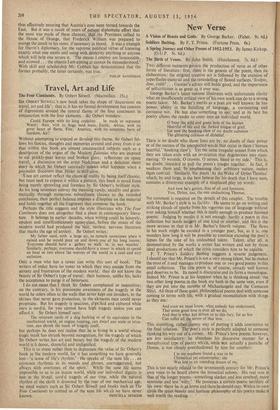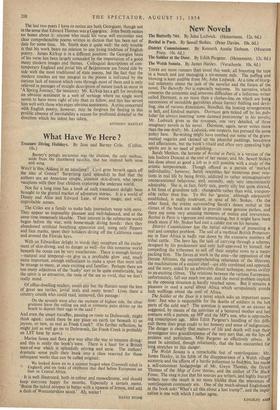New Verse
A Spring Journey and Other Poems of 1952-1953. By James Kirkup. (0.U.P. 8s. 6d.)
The Birth of Venus. By John Smith. (Hutchinson. 7s. 6d.)
Two different moments govern the production of verse as of other forms of literature: first, there is the genesis of the poem, then its elaboration: the original creative act is followed by the excision of superfluous material and the remodelling of flawed surfaces. `Sculpte, lime, cisele' ... Gautier's advice still holds good, and the importance of self7criticism is as great as it ever was.
George Barker's latest volume illustrates with unfortunate clarity what an insufficiently critical view of his own work can do to a strong poetic talent. Mr. Barker's merits as a poet are well known: he has power, ability in the handling of language, a coruscating and corrosive wit. He has also something to say; and at its best his poetry allows the reader to enter into an individual world.
0 from the wild and green hole of the human Hcartful of lies and the forked tongue of grief, Let now the hooking claw of my doubt summon The glittering colossus of disbelief.
There is no doubt who those lines are by, no doubt of their power or of the success of the unexpected-words that occur in them ('human heartful," hooking claw'). Yet the same irregular sonnet from which they are taken ends with an invocation that degenerates into stam- mering: '0 wounds, 0 crowns, 0 zeroes, bleed at my side.' This is, no doubt, intended to pull the poem's images together. In fact, it weakens them and, by emphasising their arbitrary nature, makes them comical. Similarly, the poem 'At the Wake of Dylan Thomas' which, by and large, is the best lament for his death that I have seen, contains a'clisastrous example of a misplaced play on words: And now he's gotten, first of all and foremost, You, Dylan, too, the one undoubting Thomas, .. .
No comment is required on the details of this couplet. The trouble with Mr. Barker's style is its facility. He seems to go on writing and striking clouds of sparks from his vigorous use of language without ever asking himself whether this is really enough to produce finished poems. Judging by results it is not enough: hardly a poem in this collection but needs surgery of one kind or another, and this is the more serious in that it is Mr. Barker's fourth volume. The flaws in his work might be excused in a younger poet, but, as it is, one wonders how long it will be possible to continue excusing the poet's lapses for the sake of his undoubted talent. Talent, after all, is demonstrated by the works a writer has written and not by those ideal productions of which the critic considers him to be capable.
F. T. Prince's Soldiers Bathing suggests a reverse judgement. 1 should say that Mr. Prince's is not a very strong talent, but he makes the most of it and manages to produce one or two good poems in this small collection. The title poem is, of course, already well known and deserves to be. Its mood is discursive and its form a monologue. Indeed Mr. Prince is at his happiest when he is thinking aloud: the two other long poems in the book are both in the same vein, even if they are put into the mouths of Michaelangelo and the Cumaean Sibyl. All three of these quiet, philosophical poems deal with someone coming to terms with life, with a gradual reconciliation with things as they are:
And even we must know, what nobody has understood, That some great love is over all we do, And that is what has driven us to this fury, for so few Can suffer all the terror of that love. . . .
This stumbling, rather clumsy way of putting it adds conviction to the final solution. The poet's style is perfectly adapted to someone thinking his way out of a corner. Mr. Prince's love poems, however, are less satisfactory: he abandons his discursive manner for a ; metaphysical type of poetry which, while tot actually a pastiche of ' Donne, is too closely overshadowed by him for comfort:
I in my madness found a way to be Chimerical yet catastrophic: she Was lost in an unending dream of me.
This is too nearly related to the seventeenth century for Mr. Prince's own voice to be heard above the historical echoes. His real vein is that of the longer poems—something slacker and less cerebral, more sensuous and less `witty.' He possesses a certain poetic territory of his own: there he is at home and there he should stay. Within its own circle the quiet beauty and humane philosophy of his poetrymake it well worth the reading. The last two poets I have to notice are both Georgians, though not in the sense that Edward Thomas was a Georgian. John Smith makes no bones about it: anyone who reads his verse will encounter nice clear comprehensible poems written in diction that has been out of date for some time. Mr. Smith does it quite well: the only trouble is that his work bears no relation to any living tradition of English poetry. James Kirkup is in a different position: the Georgian basis of his verse has been largely concealed by the importation of a good many modern images and themes. Colloquial descriptions of con- temporary England and jovial bits of Betjemanese are found side by side with the most traditional of state poems, but the fact that the modern touches are not integral to the poems is indicated by the curious lack of tension which runs through most of them and is only relieved in passages of straight description of nature (such as occur in 'A Spring Journey,' for instance). Mr. Kirkup has a gift for involving an obvious sentiment in a web of verbiage where no single word seems to have more right of city than its fellow, and this has served him well with those who enjoy obvious sentiments. A critic concerned with English poetry, however, may be forgiven for finding in this prolific absence of inevitability a reason for profound disbelief in the direction which his talent has taken.
ANTHONY HARTLEY



































 Previous page
Previous page